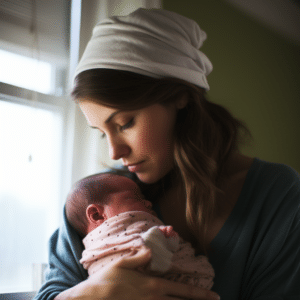Navigating Postpartum Challenges with Grace
The postpartum period can be a lot! It’s important to understand what happens. From physical healing to hormones, there are many things to think about.
Women go through physical, emotional and hormonal changes. This includes healing from childbirth, fatigue, sleep deprivation, breastfeeding and hormone fluctuations. All of these have an effect on a new mother’s wellbeing. It’s important to have support from healthcare professionals, family, and friends.
Mood swings, anxiety, and feelings of overwhelm can be part of the emotional challenges. Hormones, sleep deprivation, and caring for a newborn all contribute. It is important to seek help and prioritize self-care during this time.
The postpartum period means lifestyle adjustments. Parents need to balance their own needs with those of their baby. Open communication with partners or spouses is key. Resources and support groups can help make the transition easier.
In the postpartum period, it’s normal to face challenges. Seek help without fear of judgment. With understanding, strength, and resilience, the journey of motherhood can be navigated. You are not alone! We can overcome any obstacles that come our way.
Physical Challenges of the Postpartum Period
The postpartum period can be hard, both physically and emotionally. Here, we’ll focus on the physical part. It includes:
- Recovery from childbirth: Labor can be intense – leaving women drained and sore. It takes time to heal from any vaginal tears or C-section incisions.
- Hormone changes: Giving birth causes a massive change in hormones. This can lead to mood swings, exhaustion and even hair loss. Be aware of these changes and seek aid if needed.
- Breastfeeding struggles: Breastfeeding is a special moment for mother and baby, but it comes with its own physical issues like sore nipples, engorgement and mastitis.
- Postpartum bleeding: The body sheds the uterus lining after childbirth, which causes bleeding for a few weeks. Proper care is essential to avoid infection.
- Lack of sleep: Sleep is a luxury for new parents. With round-the-clock care for the newborn, restful sleep is hard to come by. This can have serious physical effects.
Every woman’s experience is different. Some may have bladder control problems, or diastasis recti (abdominal separation). Check with a doctor for advice tailored to your needs.
Patience and self-care are key to navigating the physical challenges. Here are a few tips:
- Rest and heal. Self-care is vital during this recovery period.
- Talk to your healthcare provider. Don’t hesitate to reach out if you have concerns.
- Surround yourself with loved ones – to help with chores, baby care and emotional support.
- Eat nutritious meals and stay hydrated.
- Do light exercises like walking or gentle stretches.
By taking care of physical challenges and taking steps towards recovery, new mothers can make it through this period with more ease. Seeking help isn’t a sign of weakness – it’s an investment in your health.
Emotional Challenges of the Postpartum Period

The postpartum period can be an emotional rollercoaster for new mums. It’s normal to feel joy, but overwhelmed, anxious and even depressed. Hormonal changes after childbirth can add to this.
Many women have the “baby blues” in the first few weeks. This includes mood swings, irritation and tearfulness. It usually passes due to a drop in hormones.
However, some women may develop postpartum depression. This is more serious and needs medical help. Symptoms include persistent sadness, anxiety and a loss of enjoyment. It can affect a mother’s capacity to care for herself and baby.
Postpartum anxiety could also be experienced. This includes worrying about the baby, restlessness and not sleeping. This makes it hard to relax and enjoy being a mum.
If struggling, it’s essential to seek help. Talking to a healthcare provider or therapist can offer support and guidance.
Emily, a first-time mum, had sadness and exhaustion after giving birth. Despite her support system, she found it tough to cope with motherhood and sleep deprivation.
Fortunately, Emily got help from her healthcare provider. They diagnosed her with postpartum depression. With therapy and medication, she gradually overcame her emotional challenges. She was then able to bond with her baby girl.
*Name has been changed for privacy reasons.
Hormonal Changes and Challenges
Postpartum period brings hormonal changes which can be hard to manage. Estrogen and progesterone are some hormones that fluctuate during this time. This can lead to mood swings, fatigue, and a risk of postpartum depression.
Every woman has a unique experience. Factors like sensitivity to hormones and support systems play a role. Loved ones and professional help can be beneficial in managing these challenges.
Sometimes, women may face even more difficulty because of severe hormone imbalances. This shows the need to recognize and address hormonal challenges quickly. Healthcare professionals can give better support and care to new mothers by understanding and accepting the effect of hormones on mental health.
Relationship Challenges in the Postpartum Period
Postpartum brings unique relationship challenges. Such as:
- Changes in dynamics. Baby coming can cause shifts in responsibilities, time and priorities. This may lead to imbalance or resentment if not dealt with properly.
- Communication issues. Lack of sleep, strain and newborn caring all can cause misunderstandings and arguments. Open conversations can help.
- Adjusting to new roles. Becoming a parent means taking on new roles. Patience, empathy and joint decision-making may help.
Get support from each other, communicate needs and check in about emotions. Practice self-care, set aside quality time and seek professional help if needed. Find what works for you to strengthen your bond during this period.
Social Challenges and Support Systems
The postpartum period has its own unique set of challenges. Here are four of the main social issues and support systems to be aware of:
- Isolation: New mums often feel lonely and isolated, especially if they don’t get enough social interaction. Friends and family may not understand.
- Changing relationships: Having a baby can change relationships, especially with partners and extended family. Communication and understanding is key.
- Societal pressures: Society puts pressure on new mums to meet unrealistic standards. It’s important for them to have a supportive network where they can talk without judgement.
- Support systems: Support systems are essential. Family, friends and professional services provide emotional and practical help.
Don’t forget that each woman’s postpartum experience is different. A research study in the Journal of Reproductive Medicine by Jane A. Martin et al. showed that social support has a positive effect on postpartum mental health.
Self-Care and Coping Strategies in the Postpartum Period

Postpartum can be hard for new mums. Finding helpful self-care and coping strategies is key. Here are some tips:
- Look after your body: Eat well, stay hydrated, and get enough rest. Exercise too – it can lift your spirits and energy.
- Prioritize sleep: No sleep can make postpartum worse. Rest when the baby sleeps. Ask family or friends to help with night feedings.
- Get emotional support: Talk openly about your feelings to someone you trust. Find a support group or seek help if needed.
- Make time for you: Take moments to do what makes you happy, like reading or taking a bath.
- Have a routine: Structure your day with set times for feeding, napping, and self-care.
It’s vital to understand each suggestion and why it works. Taking care of your body helps recovery. Sleep regulates hormones and improves mood. Talking to someone allows you to express yourself in a secure setting. Personal time reinforces your identity beyond motherhood. Plus, routines provide stability and reduce stress.
In short, self-care and coping strategies are essential during the postpartum period. New mums should prioritize physical health, sleep, emotional support, personal time, and set up a routine. Be gentle with yourself and get help if needed – this is a life-changing time that needs kindness and understanding.
Conclusion:
Navigating the challenges of the postpartum period with grace and support
It can be hard to get through the time after giving birth. Physical pain, not getting enough sleep, and changes in hormones are all things that happen to new moms. Also common are mood swings, anxiety, and sadness after giving birth.
To get through this changing time, it’s important to notice the changes that happen to your body. From healing from childbirth to problems with nursing, it can be a lot. Sleep deprivation causes tiredness, so rest is key.
There are also important emotional obstacles. Changes in mood can be caused by hormones and the mental changes that come with being a new parent. It’s normal to feel anxious and stressed. Depression after giving birth may need help from a professional.
It’s important to ask people you care about for help. They can help you feel better and do things around the house. When moms join support groups, they can get to know and understand each other better.
Self-care is very important. Activities that help you relax and relieve stress are good for your general health. Taking time for yourself gives you a chance to feel better.
Challenges after giving birth are becoming more and more obvious. Confinement periods help people get better by giving them time to rest physically and feed their emotions. No matter what the societal norms are, support stays the same.
Frequently Asked Questions
FAQ 1:
Q: What is the postpartum period?
A: The postpartum period, also called the “fourth trimester,” is the time right after giving birth when a woman’s body and emotions change as it goes back to how it was before she was pregnant.
FAQ 2:
Q: What are some common physical challenges during the postpartum period?
A: Pain or soreness in the perineal area, breast engorgement, urinary or fecal incontinence, tiredness, trouble breastfeeding, or soreness in the nipple are all common physical problems in the postpartum period.
FAQ 3:
Q: Are there any emotional challenges experienced during the postpartum period?
A: Yes, many women experience a range of emotions during the postpartum period, including mood swings, baby blues (short-term feelings of sadness or irritability), and postpartum depression (a more severe and longer-lasting form of sadness, anxiety, and fatigue).
FAQ 4:
Q: How long does the postpartum period last?
A: The postpartum period typically lasts for about six weeks, although individual experiences may vary. It is important to note that the physical and emotional changes during this period can persist beyond the six-week mark.
FAQ 5:
Q: What are some challenges faced by new mothers during the postpartum period?
A: During the time after giving birth, it can be hard for new mothers to get used to caring for a baby, get enough sleep, take care of the house, and deal with changes in their body image.
FAQ 6:
Q: How can one cope with the challenges of the postpartum period?
A: Getting help from family, friends, or support groups, putting self-care first, getting enough rest, asking for professional help if you need it, and keeping open communication with your healthcare providers are all ways to deal with the challenges of the postpartum time.






